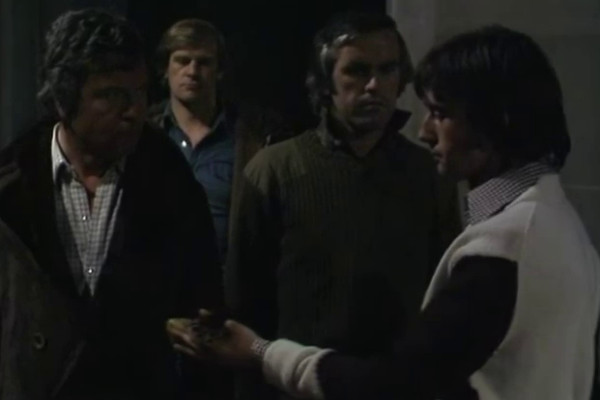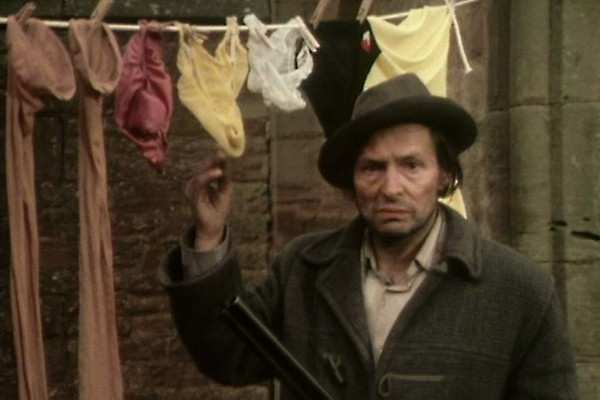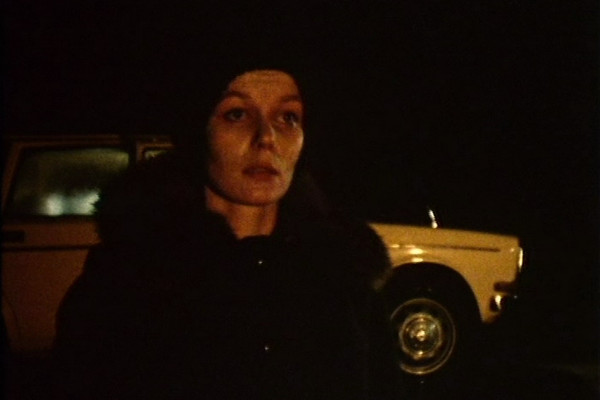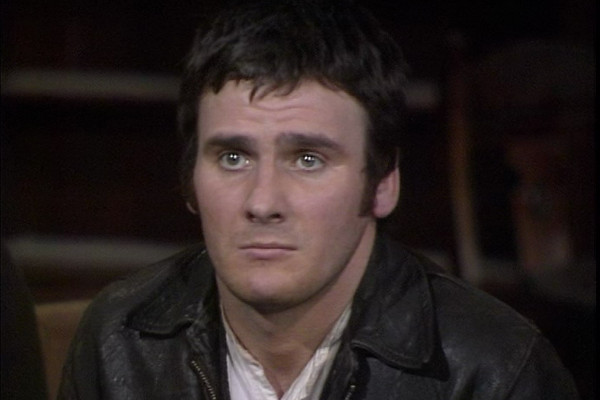


There's a certain charming "home spun" feel to a lot of Survivors, with long, extended takes and occasional line fluffs that are left in the finished product. This could be down to the incredibly fast production schedule: the first series aired from April-July 1975, and was recorded from January-June of the same year.
While The Fourth Horseman was wrapped 57 days before its airdate, this had slipped to just 33 days by the time The Future Hour was being recorded. Shot in broadcast order (albeit with some of the film sequences shot simultaneously), every episode from Starvation onwards was being filmed when the series had already begun to air. It was a situation that never improved, with the eventual series finale in 1977 finishing recording just 12 days before it was due to be broadcast.
The Future Hour finished filming on 24th May 1975, and was broadcast to the nation on June 25th. Featuring strong support from guest stars Glyn Owen and Denis Lawson, it's another basic "men with guns" episode, lacking the subtext of many lower-ranked episodes, but also produces many moments of genuine tension. If there's a complaint with the episode it's that the ending is a little too "easy", featuring the demise of two characters more out of plot expediency than any realistic happening.

One element that went missing over the course of the series were the effects of mass death among the populace. The first episode has a doctor stating that the cities will become a "cesspit" as the dead begin to outnumber the living, but the budget clearly can't stretch to showing the full horror. This is at least attempted here, with the carcasses of dead animals littering a farm visited by Tom Price.
Price's character is an interesting one, in that it warns against the dangers of casting performers with a wider reputation. While the cast of Survivors weren't exactly unknowns, they had enough anonymity to be received without undue baggage for viewers. But the thick-accented Talfryn Thomas had already been on television for well over a decade by the time Survivors aired, mostly playing comic characters.
Even putting aside his semi-comic turns in things like Doctor Who, just the previous year he had appeared as Private Cheeseman in Dad's Army. To this extent it's easy to believe that Tom Price is supposed to be comedic, particularly as the scenes between Thomas and Carolyn Seymour have a undercurrent of comic intent. (Seymour was vocal about her dislike for Thomas in real life, and doesn't do a very good job of hiding it onscreen).
There are definite signs that Price is set up to be something of a comic character in this third episode; just small touches like him coughing after taking a drag from a cigarette before exclaiming "lovely!", or feigning a leg injury to get out of work. To this end, it's something of a surprise that the character is ultimately a serious one, future episodes showing us an attempted rapist and murderer. Whether this was an attempt at serious misdirection on the part of the production team is not known; Thomas went on to be support for Ken Dodd, and appear in other sitcoms, including Hi-de-Hi!.

The second episode of Survivors has a lot to deal with, introducing two new regulars (Greg and Vic Thatcher) along with multiple subplots, including guest star George Baker as head of a community that take the law into their own hands and carry out an execution.
Being a Terry Nation script, all the various remarks about the value of monetary goods now being almost worthless are hammered home and then some, but it works well enough. Less effective is Abby's speech about relearning basic life skills, which is so over-laboured and heavily written it's like the narrative grinds to a halt for a monologue. It also undermines Abby's character, in that she's not stating any of her own observations, but instead has been inspired by things said to her by the school teacher in the first episode.
The world of the Survivors is an intriguing one, in that while such things as microwave ovens and home computers were invented, they were far from commonplace, and so their universe takes place in a parallel reality where such things never got invented for mass consumption, and even a standard video recorder was then a luxury which the general populace wouldn't have been familiar with. Essentially they were at the age of a technological revolution that, in their timeline, never happened.
In 2020 a great number of the UK population were ill-content with being forced to stay indoors, a spoilt populace over 70 years advanced from the genuine deprivation of WWII; a mindset so ensconced in the constant satisfaction of the id that the notion of having to stay indoors watching Netflix for a few weeks was regarded as hardship.
It's perhaps summed up best by Head, the superb satirical feature film of The Monkees, where the group are told by a factory steward: "Pleasure... the inevitable byproduct of our civilisation. A new world, its only preoccupation will be... how to amuse itself. The tragedy of your times, my young friends, is that you may get exactly what you want."
Ultimately the question needs to be considered.... did the Survivors miss out... or did we?

In 2019 Survivors was something of a dated show, a 70s relic with a subtext that was "a little bit racist". In 2020, the concept of a virus originating in China and quickly spreading throughout the world has become reality, with many of the details of the series shockingly prescient.
This first episode, given the star power of Peter Bowles as Abby Grant's doomed husband, sets out a number of details that have proven to be incredibly accurate. There's the time from infection to death being given as "six days" (the average time from infection to symptoms of COV19 is five days), along with the characters having to keep distanced, and the rate of spread accelerated through international travel.
Pennant Roberts is known by cult TV fans as the director of some languidly-paced Blake's 7 and Doctor Who stories, though these were all post-Survivors... before this, his work was mainly straight drama, with the only SF credit on his resume a couple of episodes of Doomwatch. He was one of three directors working on the first series, along with Terence Williams and Gerald Blake. While Williams and Blake directed four each, Roberts was very much the lead director on the show, helming five of them.
It's easy to see why Roberts was given the job, as he was able to deal with the fast turnaround schedule. Episodes would be shot over 4-and-a-half days after a 2-and-a-half day rehearsal, then the director would be expected to complete an edit in a single day. As this included the extensive location work, shot on film for the first six episodes, then the studio time would be just two-and-a-half hours on a multi-camera set up.
It's easy to look back on the work of some of the less flashy directors of the age and criticise their work in comparison to others, but such a rapid turnover rate would realistically have contained very little room for error. There is a certain Acorn Antiques feel to the studio scenes in this first episode, but you have to admire the cast being able to deliver lengthy lines of dialogue, in some cases while genuinely cooking a fry up dinner.
With Roberts directing and Terry Nation's writing at its most exposition-heavy, there is perhaps the desire that this episode could have had another draft, and been given far longer to record, but such things weren't an available luxury at the time. Originally planned to start shooting in October 1974, strike action meant that the series didn't get underway until January 1975. As the series was also pulled forward around four months in the BBC1 schedules, the time to get things completed were ridiculously short.

Revenge saw more turbulence behind the scenes as the high pressure of filming caused Terry Scully (Vic Thatcher) to have a nervous breakdown. Certain rewrites were carried out, and a new actor, Hugh Walters, was quickly brought in to take over playing the character. It's to Walters' credit that he gives such an impressive performance in such unusual circumstances, reprising someone else's part at extreme short notice. Sadly, Walters wasn't rewarded for his efforts; the character appeared in the final episode of 1975's run, then was dropped the following year.
Revenge is an interesting insight into how mental health was seen at the time. An unusually unfriendly Paul doesn't really believe in the nature of depression, and thinks that Vic attempted suicide for attention. Emma is sympathetic towards Vic's plight, but doesn't believe that Laura has post-natal depression. Both have their prejudices, but in different directions. In the real world, that same year saw an amendment to the Mental Health Act, which basically granted extra powers of detention, highlighting what a taboo such things were at the time.
What makes Revenge rate so highly is the offbeat resolution, where the nature of revenge and desire for revenge is subverted in a way that's perhaps unexpected. Also in there is a show-stopping dinner party, with Walters holding the rest of the group to attention as he details the cruelty he received at the hands of Anne Tranter, the callous woman who, in Genesis, had left him to die.

As spoilers have been avoided as much as possible during this article, then the core plot of this episode won't be laboured on. Not even the fact that only the men have to draw lots to carry out a decision, despite the fact that physical strength doesn't play a factor (Vic is crippled) and some of them didn't agree with the decision.
It's fair to say that there are many twists and turns of the narrative like this, the series stretching credulity as far as it will possibly go without snapping in order to produce a terrific conceit: a man with learning difficulties is mistakenly believed to be a killer. With the rest of the group deciding his fate, it explores not only their sense of morality, but also confronts their own prejudices.
The concept of an non-disabled actor portraying someone with learning difficulties was relatively commonplace at the time, and almost unthinkable now. (We'll ignore the exception of the execrable sitcom Derek). Just the year before, John Kane had played "Tommy" in Jon Pertwee's final Doctor Who story, and in 1972 Barry Jackson had starred in a BBC play called Horace, which later went on to be an ITV comedy drama in the early 80s.
Those looking for some kind of indication of the time that has passed in the series may get it here. If we take the opening title sequence as part of the narrative, then it cites the viral outbreak being spread throughout August and September, with the final digit of a "197#" obscured. If we assume this to be the August 1975 of when the series was originally due to air, then the May 1st cited here must be May 1976. The final episode of the run, A Beginning, is referenced as being set on the longest day of the year, so we must assume June 21st 1976. Whether it's possible for all the many events and crop growing of these 13 episodes to fit into a ten month period is open to question...